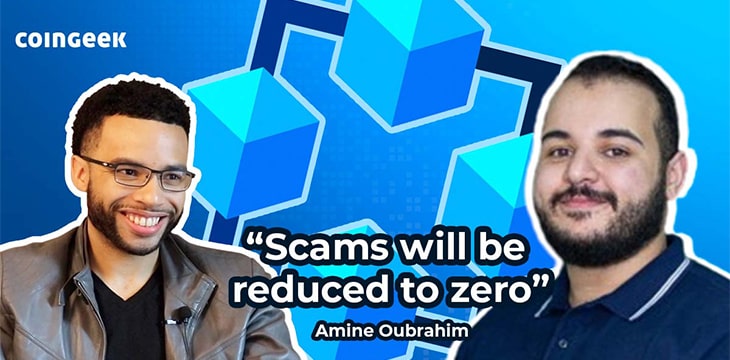|
Getting your Trinity Audio player ready...
|
BSV developer and YouTube personality Joshua Henslee spoke to Amine Oubrahim from Nomad Media Club about NFTs. They covered a broad range of topics like NFT scams and how to identify them as well as how they can have real utility as the industry matures.
Identifying NFT scams
Oubrahim begins by saying that he’s passionate about helping people identify NFT scams. By his estimation, 95% of NFT projects in the last six months could be classified as scams. He believes that some teams have good intentions and decide to exit when things don’t go their way, but he reminds us that others have more malevolent intentions from the outset. Despite this, he believes that the ‘Wild West’ era of NFTs is over.
Turning his attention to how people scam in the NFT space, Oubrahim mentions insider trading and automated bots buying and selling to make it seem like there’s demand. He outlines how some wash trade NFTs with their own funds to get them listed on lists that track trading volume, value, and other stats.
“None of this is legit behavior,” Oubrahim reveals.
To avoid falling prey to these scams, Oubrahim recommends looking at the team page and generally avoiding projects offered by anonymous teams or people. While there are exceptions to this, he notes that you have to question why a team would want to remain anonymous. There could be a legit reason, but these days, people should be willing to stand by their work and be accountable.
Oubrahim also states that there are more creators than buyers now, by his estimation, so the hype phase around NFTs is probably over. This should allow quality to rise to the top, giving honest, transparent teams a chance to shine. “Scams will be reduced to zero,” he says, noting how some projects now require KYC verification to participate in mints. Henslee points out the similarities to the 2017 ICO frenzy, which eventually died down.
It’s not all scams—there is real utility in NFTs
Dr. Craig Wright has pointed out how NFTs can have real utility on several occasions. He has mentioned legit use cases like verifying the authenticity of luxury goods, minting tickets to events, and tracking items through supply chains. Of course, all of these will require a low-cost per mint to be viable. Platforms like RareCandy.io provide that on the BSV blockchain.
Delving into legit use cases a bit, Oubrahim points out that NFTs can remove the barriers to entry for investment. They are also starting to give people legitimate ways to earn recurring revenue. They can, when done legally, get investors closer to the team and creators, too. This was talked about at length at the recent BSV Global Blockchain Convention: next-generation NFTs are already here.
Drilling down on this point, Henslee gives the example of audio NFTs as having the potential to provide tangible value. They can bring artists and fans closer together and remove the barriers between them. In his view, Spotify and big platforms are taking advantage of both sides by paying artists pennies while users have to deal with ads and data tracking. This is the peer-to-peer transaction that Satoshi Nakamoto hoped to bring about when he invented the Bitcoin protocol.
Oubrahim does not believe NFTs will kill Spotify because of things like ease of use and other factors like music licensing issues. He says it would be unwise to build something to rival or replace Spotify, and it would be better to create something for people who wouldn’t use Spotify anyway. He speaks about his own project, which is bringing value to artists rather than fans and music listeners. The artist buys the NFT to get onto the platform and gains access to music mastery tools, studios worldwide, NFT ticketing services, and more. Some artists will also earn ad revenue from holding these NFTs, which is the true definition of NFTs that have real value. Platforms like Jamify on BSV aim to bring this sort of value to the NFT space, too.
Wrapping up, the pair discuss one more way NFTs can bring real valuable change to the world; by dealing with ticket scalpers. These individuals and groups notoriously buy tickets for concerts and events and resell them at multiples in secondary markets. NFTs could change this, meaning that any additional profit earned goes to the artist or is split equally between all involved parties. They could also potentially eliminate ticket scalping altogether.
Key takeaways
The greater fool nature of the industry, which involves buying digital items to speculate on and sell to someone else for a higher price, is changing.
Utility is starting to become the central focus as the hype dies down and people look at the real use cases for NFTs. Projects like Haste Arcade and CryptoFights are leading the way, showing us that in-game NFTs have value and utility.
This trend towards utility will only continue as regulators get to grips with the markets, things like KYC-verified wallets become the norm globally, and the feverish speculation that has characterized the market so far dies down as easy money policies recede into the past.
Watch: The BSV Global Blockchain Convention, Blockchain: Data Power-Ups and NFTs for eSports & Online Games
https://www.youtube.com/watch?v=ggbZ8YedpBE&t=7683s

 02-20-2026
02-20-2026 




